Basketball Terminology 101
Basketball Terminology Demystified
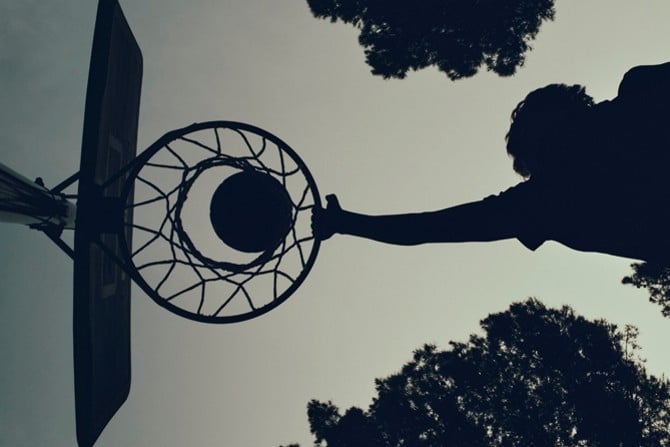
From the alley oop to zone defense, a successful dunk to the failed brick, in this article, you'll learn what all these basketball terms mean. Whether it's passes, throws, fouls, tactics or rules: basketball is growing in popularity and here to stay. Find out where basketball terminology comes from and become a better baller off the court too.
The Air Ball
An airball is essentially a blank and rather embarrasing for basketball players. When a player hits neither the hoop nor the back board, the ball misses everything and lands out of bounds resulting in a turn of possession. This is referred to as an airball, regardless whether thrown from the free throw line or three point line. On the court at any level, an airball is very embarassing. Expect the fans to shout or the opponent to smile, as the rim and backboard are quite big. There's no excuse to throw an airball.
The Alley oop
That magical moment when a long pass is slammed home midair is one that brings wonder and joy to every fan. Player A see Player B free and moving to the rim. Player A passes and Player B catches, redirects and jams the ball for 2 points. This fast sequence results in impressive scenes. Lock and step teamwork and perfect timing are essential here, because the alley-oop is only successful if the opposing team is caught sleeping.
The Ankle Breaker
The "ankle breaker" refers to a defender who trips over his own feet while trying to defend. Through nimble dribbing, the attacker fakes movement to draw the defender. If the attacker sells his movement well enough, the defender can stumble, leaving the attacker with a clear shot. Ankle breakers take skill on the part of the attacker and are seldom seen on the court.
And One
If a player manages to score points despite being fouled and the referee calls a foul, a free throw is awarded to the fouled player. In basketball, a free throw is usually seen as a guaranteed point. The fouled team scored two points and now shoots a free throw, hence the term "and one". Click here for our article „Basketball rules in a nutshell“, in which we explain fouls and their penalties, among other things.
Assists
Passes that helped lead to a basket are called assists. They are listed per player and are one of the essential statistics for analysing player performance at the end of a game. Without assists, you have no points!.
So you'd like to know how to raise your assists in basketball? Training will help! Watch the following video for helpful advice on what drills will help you become a better passer.
The Backcourt
Backcourt refers to your defensive half of the court. After your opponent scores, you first have to advance the ball from your backcourt. From among your roster of player positions, usually the point guard or shooting guard are responsible for this task.
Baller
Popularly talented basketball players are referred to as ballers. However, this term is more basketball slang than technical jargon. Although the term has its origins in sport, nowadays anyone who is perceived as particularly successful, impressive or cool can be described as a baller.
Ballhandling
Ball handling is the be-all and end-all for every basketball player and is a catch-all for dribbling, throwing, passing and catching. If you have the necessary coordination along with speed and accuracy, you'll have a definite advantage over the competition.
The Block
The terms block or blocking always refer to defense in basketball. This includes, for example, cutting off running routes or deflecting shots. A block usually leads to a turn over. Blocks are another important statistic in basketball to analyse player performance. In contrast to a steal, a player who makes a block does not necessarily gain control of the ball. You can see the most spectacular blocks in NBA history in the following video:
The Brick
If a shot fails, but the ball hits the board or rim hard, this is called a brick.
Buzzer Beater
The siren sounds while ball is still in the air? That's what we call a buzzer beater - the clock beats its dying seconds while the ball is zooming towards the rim. Often, the final shot is the difference between a win or lose.
Crunch Time
Closely related to the buzzer beater is crunch time - meaning the final minutes of the game. Especially when the score is close, basketball players do everything in their power during crunch time to decide the game in their favor.
The Crossover
The crossover is a common dribbling technique, where the ball is bounced off the ground so that the other hand receives the ball. If you want to train your crossovers, see our article „8 Basketball Dribbling Drills“.
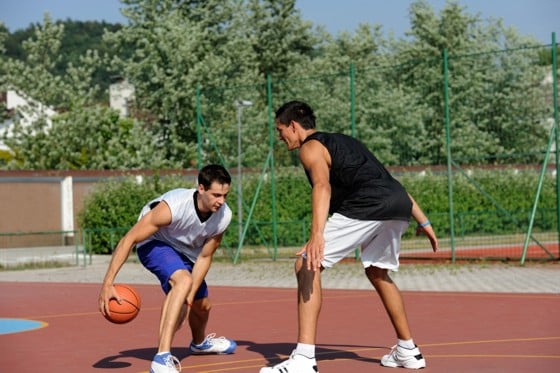
Downtown
Downtown refers to all shots further than the three point line. It's unwise to shoot from downtown as the chance of success diminishes with each foot further from the basket. If a player still manages to sink a ball from downtown, the play usually appears on highlight reels.
Dropping Dimes
Without passes, no baskets - assisting a basket is referred to as dropping a dime. As the term on fire applies for scoring every shot, dropping dimes refers to being on fire in terms of passing. Where exactly the terms dropping dimes originates is disputed. Maybe the term came from the days of pay phones. If someone loaned you a dime, you could call for longer, and they'd be your hero.
The Dunk
This is one term that does not need explaining. Want to learn how to dunk? Take some tips from our article „Dunking in Basketball“.
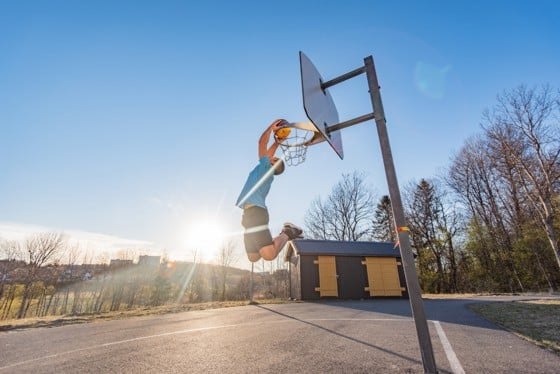
The Fade Away
A normal shot is made by jumping straight up in the air. However, for a fade away, the shooter jumps backwards while shooting to gain room for a clear shot. Fade aways take years of practice and are very impressive. You can find tips on shooting in our article Shooting in Basketball.
From Coast to Coast
When a player manages to dribble the ball from his own defensive end to the opponents basket is said to have moved "coast to coast".
By the way: Smaller players are typically the better ball handlers. Their smaller size means that their distance to the ground is less, so that they can dribble the ball faster. For example, Chris Chiozza, then point guard for the Florida Gators, managed to throw the decisive basket in the game against the Wisconsin Badgers in 2017 and secure the victory in the last four seconds:
Front court
As opposed to the back court, the front court is the opposing half including all offensive player positions such as Small Forward, Power Forward und Center.
Garbage Time
In contrast to crunch time, where both teams try to get as much as possible out of the last few minutes, garbage time describes the last minutes of a game in which there is already a clear winner. So you could just as easily stop here and the result would be the same.
Goaltending
Goaltending is illegal in basketball while a block is legal. In the arc of a ball's flight, if the opposing team touches the ball before the ball reaches its apex, it is called a block. If the opposing team, however, touches the ball after its apex, goaltending is called. If a three point shot was goaltended, three points are awarded. If a 2 pointer was goaltenden, only 2 points are awarded.
Granny Shot
As the name suggests, the granny shot is a sight for sore eyes. The ball is not shot with typical form. In a granny shot, the player bends forwards, holds the ball with two hands and shoots upwards from between the legs. Some players, such as Rick Berry, have made a name for themselves using the underhand shot to shoot baskets, even from a distance.
The Hook Shot
The hook shot describes a shooting technique in which, instead of facing the basket, the player looks to the side so that their shoulder faces the basket. The player controls and throws the ball with the hand that is further away from the basket. Shooting the ball from your outside shoulder makes defending the shot nearly impossible.
The Lay Up
The lay-up is the true tried and trusted way to put the ball in the basket. You dribble towards the basket at a 45-degree angle, jump forwards, precisely throw the ball against the glass and voila! Two points. In our article, Passing Techniques in Basketball you find plenty of tips and tricks to improve your game.
Mismatch
As there are 5 players per side in Basketball, you are matched against and player, who has the same role in the team as you. When there is an apparent size different between two players matched, this is called a mismatch. This term can also apply to ability and not just physical size. Being smaller is not universally a disadvantage.
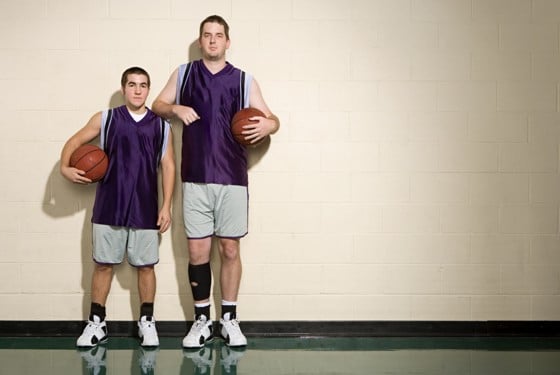
The Pick and Roll
The pick and roll is a classic offensive tactic on the court. The goal is to distract the opponent for a quick basket. With the ball in your team's possession, run up to the defender shadowing the ball carrier and stand in his path. The player that blocks with his body then fades towards the basket. The confusion of four players on the court being in close proximity sometimes allows the player blocking to snake towards the basket for an easy basket.
Pivot
The number of steps the ball carrier can make after having stopped dribbling is limited in basketball. However, the pivot is permitted. The player must have one leg fixed to the ground, called his pivot leg. With the other leg, he can step around in a circle pattern as much as he wants. Pivots allow the player in possession of the ball to protect the ball.
Points
Baskets are counted differently depending where they are made. A team gets two points for any shot within the 3-point line. Outside of the 3-point line, the team is awarded three points.
Rebound or Board
A rebound occurs when a team takes possession of the ball again after it bounces off the back board or rim. This allows the team another attempt to score during their possession. It also resets the shot clock. Rebounds by the attacking team is called offensive rebounds and rebounds by the defending team are called defensive rebounds. In our article „What is a rebound?“ we go over everything you need to know about rebounds and how to practice your rebounding skills. Rebouding is a crucial statistic in player analysis.
Run and Gun
Run and Gun refers to an offensive strategie that revolves around causing turnovers and fast breaks. For example, after a defensive rebound, player's immediately begin advancing the ball up the court.
Shot clock
A team can only possess the ball for so long. The actual length depends on the league. The shot clock counts the remaining seconds of possession before the play is called dead. This rule was introduced in 1954 and had a significant impact on the speed of the game and subsequently also on the number of points, which in turn increased the excitement and appeal of basketball.
Nothing but net
The ball flies straight into the net and touches neither the rim nor the back board? That's a swoosh, because the net is pushed up through the ring by the force of the ball and is reminiscent of splashing water when a stone falls into it - not the safest way to get the ball into the basket, but definitely very elegant.
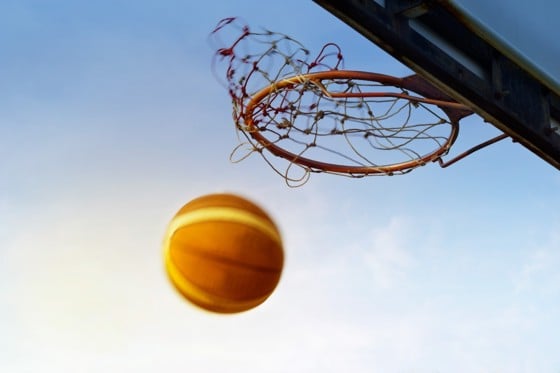
Starting Five
Starting five refers to the starting line-up in basketball. Traditionally, it consists of two guards, two forwards and a center. But a team's composition doesn't always have to be so straight forward.
A Steal
A steal is when a player from the opposing team forces a turnover by stealing the ball. But what's the difference between a steal and a blocked shot? With a steal, the attack is not only stopped, but the previously defenders immediately become the attackers. Steals are another important player stat in the game of basketball.
You need great skill and speed to make a steal. Watch the following video for tips on how to practice steals.
A Tip-In
Your teammate goes for the basket, the ball rebounds off the back board. How can you turn this failed basket attempt into a basket after all? With a tip-in! Position yourself close to the basket and execute a well-timed jump. If you manage to nudge the ball through the rim after a failed attempt, you got yourself a tip-in.
Three second lane violation
The tapped rechtangle around the basket is called the three second zone. No offensive player is allowed to stay in this area for three seconds. If so, a foul is called and a change of possession occurs. However, after stepping outside the zone, the player can re-enter it immediately and the three seconds start again. A technical foul is whistled for an infringement by an offensive player and the defending team is awarded a free throw and then possession of the ball. You can find more information about this technicality and more in our article Basketball Rules.
Traveling
Traveling is a hot button issue in basketball. It refers to the foul that is called when a player lifts both legs while he is not dribbling. The only movement that is allowed when not dribbling is pivoting. If, however, a player moves while not dribbling, the ref blows his whistle, traveling is called and a change in possession occurs.
Triple Double
A player achieves a triple double by reaching double figures (double) in the three (triple) important statistical categories such as scoring, assists, rebounds, blocks or steals categories of assists, rebounds and points. Achieving a triple double is a large feat. If a player makes a triple double, very likely his team won.
Turnover
Any form of losing the ball before a basket is scored, whether through infringements of the rules or blocks and steals, is referred to as a turnover. The opposing team then has the ball and can go on the attack.
Zone
The area, also known as the key or paint, is a square border around the basket and may not be entered by any player for more than three seconds. The line furthest away from the basket is also the free throw line. If you want to learn more about the markings on a basketball court, see our article basketball tactics.
Zone Defense
Instead of man-to-man defense, where each player covers a dedicated player, in zone defense each player is responsible for a specific section of the court that he defends. If the ball changes location on the court, in zone defense, the players must adapt and move around. For a more in-depth look at how this plays out, see our article tactics in basketball.
Which basketball term is the best of all?
".. With a steal, they turned the ball over! Now they're on a quick break away. He goes for the fade-away and it's nothing but net!" With these newly learned basketball terms, you'll sound like a real fan. If you want to look like a real basketball player, you'll find what you're looking for in our owayo store. You can find matching basketball shorts and jerseys for men, women and kids. Alternatively, feel free to customise design your own basketball jerseys.
And if you want to delve deeper into basketball rules, strategies and techniques, you can find detailed explanations and practice tips in the owayo magazine:
Image Credits: Cover Image: Siro Rodenas Cortes/gettyimages, Image 1: technotr/gettyimages, Image 2: Isbjorn/gettyimages, Image 3: XiXinXing /gettyimages, Image 4: ipopba/ Adobe Stock
